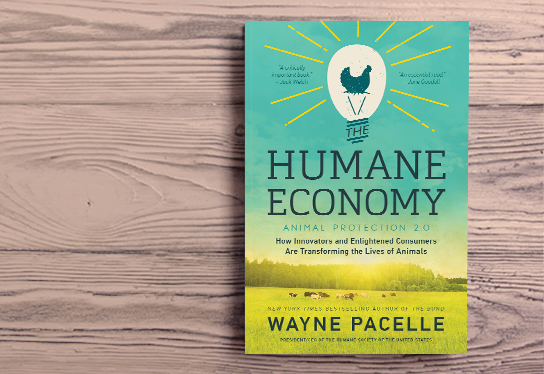It’s fitting, it seems, that on the launch day of the paperback version of The Humane Economy: How Innovators and Enlightened Consumers Are Transforming the Lives of Animals in bookstores, Burger King and Tim Horton’s announced new policies concerning the welfare of chickens raised in meat production. These major food retailers are announcing new space requirements for birds, enrichment measures and better living conditions, new breeding practices to address chronic pain and distress, and new slaughter techniques to minimize pain and distress.
Such an announcement a decade ago would have been unthinkable. But since then, we’ve seen a cascade of announcements by major food retailers pledging to get animals out of cages and crates, to end tail docking, and to re-examine the way the meat industry is raising chickens. These announcements are now issued at a steady clip from our Farm Animal Protection team, and while they are newsworthy, there’s a humdrum element to them, simply because they’re coming with such frequency.

In The Humane Economy, I argue that we are at a turning point in our relationship with animals, and when we look at animal issues through an economic lens, there’s a more compelling argument than ever to do right by animals.
Progress on animal welfare, in many ways, has become the new normal.
In The Humane Economy, I argue that we are at a turning point in our relationship with animals, and when we look at animal issues through an economic lens, there’s a more compelling argument than ever to do right by animals. Businesses with animal cruelty baked into the model face enormous risks, and those that embrace animal protection sensibilities position themselves for success and for the future.
Yet, for those of you who follow this blog, you know that there’s more to the story than inevitable progress. Especially given the new political landscape in our nation – a president with no record on animal protection and a Republican Congress closely tied to the NRA and agribusiness interests — we are facing immense challenges too. In fact, today, the U.S. Senate is set to take up a resolution to roll back critically important rules on 16 national wildlife refuges in Alaska and to allow that state to unleash an assault on grizzly bears and wolves, as has been done in other parts of Alaska for the past two decades (after former Governor Tony Knowles stopped the ruthless aerial gunning of wolves and grizzly bears).
[Editors Note: On March 21st] Senate overturns rule from professional wildlife management agency and sanctions killing wolf pups at their dens and hibernating
In my book, I make the case that reform is happening through multiple channels – corporate reforms, court rulings, shifting public attitudes and growing awareness, and public policies. The humane economy isn’t achieved solely by corporations behaving more responsibly, but also by government setting minimum standards for the care of animals. It’s not free-market capitalism that is the answer to animal cruelty problems, but regulated capitalism driven by an informed and engaged consumer base and electorate. There is a dynamism between the public and private sectors that has been reshaping our relationship with animals, and The HSUS and its affiliates have been at the forefront of propelling the ideas that animate it.
Embracing animal protection is no longer a burden or a sacrifice. It’s an opportunity for us, as individuals, to grow and to be empowered, for businesses to grow and to connect with consumers, and for government to uphold the values we hold dear and to set some basic standards and rules of conduct regarding animals in our society.
But progress is not linear. There are special interests with special pull in the current political climate, and they are working to thwart future progress for animals and even, as with the resolution in the Senate, to roll back gains we’ve made for wildlife.
One crucial element of the humane economy is an informed, engaged citizenry. While politicians may take adverse actions against animals, that should never be the final word. That’s why we have elections, and there are mechanisms to correct mistakes and to remediate acts of greed or cruelty.
The humane economy has powerful momentum, but it is not unstoppable. To bring it to life, we’ll need your engagement and commitment. Yes, there are still so many problems in our treatment of other creatures, and they face so many threats, but we are winning the battle of ideas and convincing the overwhelming mass of consumers that animal protection is a core value in our society. But change this big is not self-executing – it requires our full focus.
The Humane Economy recounts the progress we’ve made in so many different sectors of the economy, and forecasts where we go from here. We are taking measurable steps forward, but challenges are upon us right now and we must confront them head on.
The post Can the humane economy continue to advance in our challenging times? appeared first on A Humane Nation.
Enviroshop is maintained by dedicated NetSys Interactive Inc. owners & employees who generously contribute their time to maintenance & editing, web design, custom programming, & website hosting for Enviroshop.
